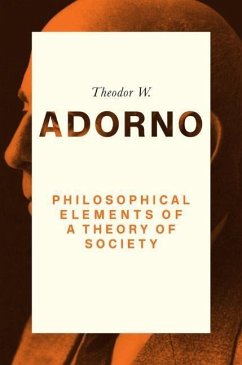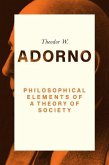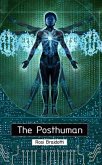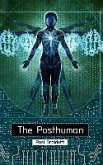Theodor W. Adorno
Philosophical Elements of a Theory of Society
24,99 €
inkl. MwSt.
Versandfertig in über 4 Wochen

12 °P sammeln
Theodor W. Adorno
Philosophical Elements of a Theory of Society
- Broschiertes Buch
- Merkliste
- Auf die Merkliste
- Bewerten Bewerten
- Teilen
- Produkt teilen
- Produkterinnerung
- Produkterinnerung
As an exile in America during the War, Theodor Adorno grew acquainted with the fundamentals of empirical social research, something which would shape the work he undertook in the early 1950s as co-director of the Frankfurt Institute for Social Research. Yet he also became increasingly aware of the 'fetishism of method' in sociology, and saw the serious limitations of theoretical work based solely on empirical findings.
In this lecture course given in 1964, Adorno develops a critique of both sociology and philosophy, emphasizing that theoretical work requires a specific mediation between the…mehr
Andere Kunden interessierten sich auch für
![Philosophical Elements of a Theory of Society Philosophical Elements of a Theory of Society]() Theodor W. AdornoPhilosophical Elements of a Theory of Society68,99 €
Theodor W. AdornoPhilosophical Elements of a Theory of Society68,99 €![Problem Spaces Problem Spaces]() Celia LuryProblem Spaces22,99 €
Celia LuryProblem Spaces22,99 €![Problem Spaces Problem Spaces]() Celia LuryProblem Spaces65,99 €
Celia LuryProblem Spaces65,99 €![The Posthuman The Posthuman]() Rosi BraidottiThe Posthuman19,99 €
Rosi BraidottiThe Posthuman19,99 €![The Posthuman The Posthuman]() Rosi BraidottiThe Posthuman74,99 €
Rosi BraidottiThe Posthuman74,99 €![Experience Experience]() Scott LashExperience24,99 €
Scott LashExperience24,99 €![Experience Experience]() Scott LashExperience68,99 €
Scott LashExperience68,99 €-
-
-
As an exile in America during the War, Theodor Adorno grew acquainted with the fundamentals of empirical social research, something which would shape the work he undertook in the early 1950s as co-director of the Frankfurt Institute for Social Research. Yet he also became increasingly aware of the 'fetishism of method' in sociology, and saw the serious limitations of theoretical work based solely on empirical findings.
In this lecture course given in 1964, Adorno develops a critique of both sociology and philosophy, emphasizing that theoretical work requires a specific mediation between the two disciplines. Adorno advocates a philosophical approach to social theory that challenges the drive towards uniformity and a lack of ambiguity, highlighting instead the fruitfulness of experience, in all its messy complexity, for critical social analysis. At the same time, he shows how philosophy must also realise that it requires sociology if it is to avoid falling for the old idealistic illusion that the totality of real conditions can be grasped through thought alone.
Masterfully bringing together philosophical and empirical approaches to an understanding of society, these lectures from one of the most important social thinkers of the 20th century will be of great interest to students and scholars in philosophy, sociology and the social sciences generally.
In this lecture course given in 1964, Adorno develops a critique of both sociology and philosophy, emphasizing that theoretical work requires a specific mediation between the two disciplines. Adorno advocates a philosophical approach to social theory that challenges the drive towards uniformity and a lack of ambiguity, highlighting instead the fruitfulness of experience, in all its messy complexity, for critical social analysis. At the same time, he shows how philosophy must also realise that it requires sociology if it is to avoid falling for the old idealistic illusion that the totality of real conditions can be grasped through thought alone.
Masterfully bringing together philosophical and empirical approaches to an understanding of society, these lectures from one of the most important social thinkers of the 20th century will be of great interest to students and scholars in philosophy, sociology and the social sciences generally.
Produktdetails
- Produktdetails
- Verlag: Polity / Wiley & Sons
- Artikelnr. des Verlages: 1A745679480
- 1. Auflage
- Seitenzahl: 192
- Erscheinungstermin: 18. März 2019
- Englisch
- Abmessung: 226mm x 150mm x 18mm
- Gewicht: 318g
- ISBN-13: 9780745679488
- ISBN-10: 074567948X
- Artikelnr.: 53692539
- Herstellerkennzeichnung
- Libri GmbH
- Europaallee 1
- 36244 Bad Hersfeld
- gpsr@libri.de
- Verlag: Polity / Wiley & Sons
- Artikelnr. des Verlages: 1A745679480
- 1. Auflage
- Seitenzahl: 192
- Erscheinungstermin: 18. März 2019
- Englisch
- Abmessung: 226mm x 150mm x 18mm
- Gewicht: 318g
- ISBN-13: 9780745679488
- ISBN-10: 074567948X
- Artikelnr.: 53692539
- Herstellerkennzeichnung
- Libri GmbH
- Europaallee 1
- 36244 Bad Hersfeld
- gpsr@libri.de
Theodor W. Adorno (1903-1969), a prominent member of the Frankfurt School, was one of the most influential thinkers of the 20th century in the areas of social theory, philosophy and aesthetics.
* Editors' Foreword * LECTURE 1 * Philosophy and sociology as scientific disciplines
Reflection and theory
Tasks of the lecture
Provisional conception of a theory of society
The crisis of theoretical thought; positivism
Weber's relationship to theory
Weber's concept of 'understanding'
Weber's concept of 'rationality'
Bureaucracy and domination
Dialectics; theoretical aspects of atheoretical thinking * LECTURE 2 * Facts and theory
Concretion and overcoming of the factual
Critique of the classificatory logic of positivism
The relationship between natural sciences and social sciences, nature and society
The anti
theoretical character of sociology
Hypothesis formulation and insight
The necessity of reflection; Darmstadt community studies
Theory formation presupposes a consideration of discontinuity; The status of facts within the complexion of society as a whole * LECTURE 3 * Ibsen's Hedda Gabler; Registering facts and productive imagination
The concept of tendency
Capitalist calculus
The exchange relationship
Tendency and prophecy; The new as the core of theory
The non
identical in theory
Theory and dynamics of society
Tendency and totality
Social reality and theory * LECTURE 4 * Tendency and trend
Dependence of theory on its object; Distrust towards theory formation
Theory as a unified system of society; Liberalism, Marxism, German Idealism
System as tendency
Modifications of 'market society' as results of class struggles
Monopolizing tendency of capital; State interventionism as a crisis outlet
Integration of the proletariat * LECTURE 5 * Announcement of a lecture by Lucien Goldmann on 'Marxism and contemporary society'
Problems of theory formation; 'Work Climate' study
The system
immanence of the proletariat
Class consciousness and integration
Ideology and experience: The phenomenon of personalization
Insight into society in theoretical thought
System
immanent consciousness
Politics as an aspect of ideology
The meaning of changes in reality and consciousness; concretism * LECTURE 6 * The difficulty of theory formation
Concretism as an expression of powerlessness; 'Levelled middle
class society'
Exchange value as a source of pleasure
The meaning of concretism for labour organizations
The transformation of Marxian theory into state religion
Abstractism
Accusation of the bourgeoisification of the proletariat
Everyday class struggle * LECTURE 7 * Everyday class struggle
The politics of small steps
The dual character of the workers' realism; The consequences of mechanization
The dominance of conditions
Wage satisfaction
Subjectivism in sociological research
Communication research; The semblance of freedom in the exchange principle
Subjective experiences of the semblance of levelling
Supply and demand of labour * LECTURE 8 * The thin crust of integrated society
Nuanced thinking
The shift of social pressure
Changes in nominalism and epistemology
Improvements within the work process
Loss of unambiguity; Social theory between dogmatic ossification and naïve faith in facts
Semblance of integration and increasing socialization
Disintegration; Rationalization and the reality principle
The function of the system; Antagonism of power and powerlessness: Disintegration through growing integration
Integration and powerlessness
False identity of the general and the particular * LECTURE 9 * The relationship between economy and power
The negative unity of society in general unfreedom
The culture industry and analysis of ideologies
Positivism as a manifestation of ideology
The concept of the 'human being' and the 'jargon of authenticity'; ideology critique and language critique
The mythologization of antagonisms in socialist countries
The dialectic and rupture of theory and experience
Loss of experience
Theory as system and non
system; The irrationality and rationality of society; Weber's theory of science * LECTURE 10 * Contradictory object and contradiction
free theory; Rationality and irrationality
Changes in the concept of reason
The whole, in its rationality, is irrational
Dialectical theory
Critique of undialectical thought
Critique of unified sociology and the fetishization of science
The historical change in the function of science; Openness as a key concept
Functional change in the concept of science: Leibniz, Fichte, Hegel, Kant
The equation of science with truth
The danger of intuitionism; The relationship between method and matter
Announcement of the next topic: Critique of Parsons's methodology * LECTURE 11 * Critique of the ideal of the scientific method
Descartes; The postulation of method and the structure of the matter
Parsons's unified conceptual system
The relationship between psychology and sociology: Karen Horney, Erich Fromm
Freud: Sociology as applied psychology; The concept of role
Critique of the psychological reduction of social processes: Marx, Durkheim
Subject and socialization in Weber's 'understanding' sociology
The antagonistic relationship between the individual and society
The necessity of a critical reflection on method * LECTURE 12 * Fetishization of methodology instead of insight into the matter
Method I; Spontaneity of thought
Formal and transcendental logic in Kant; The character of reason
Method II; Dialectical philosophy and self
determination
Didactics; The complexity of capitalism and the Marxian method
Marx's toying with dialectics
The disastrous consequence of the primacy of method
Two meanings of the concept of method * LECTURE 13 * The dispute between positivist and critical thinking
Scientific fetishism and the acquisition of naïveté
Perfectionism of method and irrelevance of results
Weber: Material and spirit collecting
Instrumentalization of reason
The defamation of spirit
Self
examination of thought in the material
Causes of scientific fetishism
Ego weakness as a subjective reason for scientific fetishism
On the 'fear of freedom'; The employee mentality
Theory and system * LECTURE 14 * The ideal of system in rationalism: Reduction of the many to the one
Critique of systems that proceed from the subject: Hegel, Erdmann; Spinoza and Leibniz
The empiricist critique of rationalism
System frenzy and the disintegrated cosmos
The problem of the concept of system in Kant's idealism
Nietzsche and Kierkegaard; Rejection of system
On dogmatic attitudes
Systems regress to modes of representation
Systematic thinking and the administered world; Equation of theory and system in Parsons
Focus on the essence * LECTURE 15 * Inspiration and spontaneity
The reified consciousness
Kant: The worldly and scholastic concepts of philosophy; Unregulated experience
Empiricism as a corrective
The relationship between knowledge and democracy; Experimental situations
Realism and power relations; Objectivity and subjectivity * LECTURE 16 * Elements of a theory of society
'Transcendental reflection'
The classes and the production process
The irrationality of the whole and particular rationality in the administered world Ð The armament apparatus
Class character and unfreedom
'Pluralism' as a phenomenon of concealment
Changes in the sphere of competition and consumption
The intertwinement of rationality and irrationality in the processes of concentration and disintegration * LECTURE 17 * Rationality and irrationality
Power relations and control over production; Bureaucracy and domination; Sociological concept formation
Personalized epiphenomena and fascism
The independence of bureaucracy in Russia
Armament and overall social structure
The position of ideology today: De
ideologization; The consumer world
The 'consciousness industry': The change in ideology and its contemporary production
The technological veil
Language critique and reified consciousness
Critique * Editors' Notes * Index
Reflection and theory
Tasks of the lecture
Provisional conception of a theory of society
The crisis of theoretical thought; positivism
Weber's relationship to theory
Weber's concept of 'understanding'
Weber's concept of 'rationality'
Bureaucracy and domination
Dialectics; theoretical aspects of atheoretical thinking * LECTURE 2 * Facts and theory
Concretion and overcoming of the factual
Critique of the classificatory logic of positivism
The relationship between natural sciences and social sciences, nature and society
The anti
theoretical character of sociology
Hypothesis formulation and insight
The necessity of reflection; Darmstadt community studies
Theory formation presupposes a consideration of discontinuity; The status of facts within the complexion of society as a whole * LECTURE 3 * Ibsen's Hedda Gabler; Registering facts and productive imagination
The concept of tendency
Capitalist calculus
The exchange relationship
Tendency and prophecy; The new as the core of theory
The non
identical in theory
Theory and dynamics of society
Tendency and totality
Social reality and theory * LECTURE 4 * Tendency and trend
Dependence of theory on its object; Distrust towards theory formation
Theory as a unified system of society; Liberalism, Marxism, German Idealism
System as tendency
Modifications of 'market society' as results of class struggles
Monopolizing tendency of capital; State interventionism as a crisis outlet
Integration of the proletariat * LECTURE 5 * Announcement of a lecture by Lucien Goldmann on 'Marxism and contemporary society'
Problems of theory formation; 'Work Climate' study
The system
immanence of the proletariat
Class consciousness and integration
Ideology and experience: The phenomenon of personalization
Insight into society in theoretical thought
System
immanent consciousness
Politics as an aspect of ideology
The meaning of changes in reality and consciousness; concretism * LECTURE 6 * The difficulty of theory formation
Concretism as an expression of powerlessness; 'Levelled middle
class society'
Exchange value as a source of pleasure
The meaning of concretism for labour organizations
The transformation of Marxian theory into state religion
Abstractism
Accusation of the bourgeoisification of the proletariat
Everyday class struggle * LECTURE 7 * Everyday class struggle
The politics of small steps
The dual character of the workers' realism; The consequences of mechanization
The dominance of conditions
Wage satisfaction
Subjectivism in sociological research
Communication research; The semblance of freedom in the exchange principle
Subjective experiences of the semblance of levelling
Supply and demand of labour * LECTURE 8 * The thin crust of integrated society
Nuanced thinking
The shift of social pressure
Changes in nominalism and epistemology
Improvements within the work process
Loss of unambiguity; Social theory between dogmatic ossification and naïve faith in facts
Semblance of integration and increasing socialization
Disintegration; Rationalization and the reality principle
The function of the system; Antagonism of power and powerlessness: Disintegration through growing integration
Integration and powerlessness
False identity of the general and the particular * LECTURE 9 * The relationship between economy and power
The negative unity of society in general unfreedom
The culture industry and analysis of ideologies
Positivism as a manifestation of ideology
The concept of the 'human being' and the 'jargon of authenticity'; ideology critique and language critique
The mythologization of antagonisms in socialist countries
The dialectic and rupture of theory and experience
Loss of experience
Theory as system and non
system; The irrationality and rationality of society; Weber's theory of science * LECTURE 10 * Contradictory object and contradiction
free theory; Rationality and irrationality
Changes in the concept of reason
The whole, in its rationality, is irrational
Dialectical theory
Critique of undialectical thought
Critique of unified sociology and the fetishization of science
The historical change in the function of science; Openness as a key concept
Functional change in the concept of science: Leibniz, Fichte, Hegel, Kant
The equation of science with truth
The danger of intuitionism; The relationship between method and matter
Announcement of the next topic: Critique of Parsons's methodology * LECTURE 11 * Critique of the ideal of the scientific method
Descartes; The postulation of method and the structure of the matter
Parsons's unified conceptual system
The relationship between psychology and sociology: Karen Horney, Erich Fromm
Freud: Sociology as applied psychology; The concept of role
Critique of the psychological reduction of social processes: Marx, Durkheim
Subject and socialization in Weber's 'understanding' sociology
The antagonistic relationship between the individual and society
The necessity of a critical reflection on method * LECTURE 12 * Fetishization of methodology instead of insight into the matter
Method I; Spontaneity of thought
Formal and transcendental logic in Kant; The character of reason
Method II; Dialectical philosophy and self
determination
Didactics; The complexity of capitalism and the Marxian method
Marx's toying with dialectics
The disastrous consequence of the primacy of method
Two meanings of the concept of method * LECTURE 13 * The dispute between positivist and critical thinking
Scientific fetishism and the acquisition of naïveté
Perfectionism of method and irrelevance of results
Weber: Material and spirit collecting
Instrumentalization of reason
The defamation of spirit
Self
examination of thought in the material
Causes of scientific fetishism
Ego weakness as a subjective reason for scientific fetishism
On the 'fear of freedom'; The employee mentality
Theory and system * LECTURE 14 * The ideal of system in rationalism: Reduction of the many to the one
Critique of systems that proceed from the subject: Hegel, Erdmann; Spinoza and Leibniz
The empiricist critique of rationalism
System frenzy and the disintegrated cosmos
The problem of the concept of system in Kant's idealism
Nietzsche and Kierkegaard; Rejection of system
On dogmatic attitudes
Systems regress to modes of representation
Systematic thinking and the administered world; Equation of theory and system in Parsons
Focus on the essence * LECTURE 15 * Inspiration and spontaneity
The reified consciousness
Kant: The worldly and scholastic concepts of philosophy; Unregulated experience
Empiricism as a corrective
The relationship between knowledge and democracy; Experimental situations
Realism and power relations; Objectivity and subjectivity * LECTURE 16 * Elements of a theory of society
'Transcendental reflection'
The classes and the production process
The irrationality of the whole and particular rationality in the administered world Ð The armament apparatus
Class character and unfreedom
'Pluralism' as a phenomenon of concealment
Changes in the sphere of competition and consumption
The intertwinement of rationality and irrationality in the processes of concentration and disintegration * LECTURE 17 * Rationality and irrationality
Power relations and control over production; Bureaucracy and domination; Sociological concept formation
Personalized epiphenomena and fascism
The independence of bureaucracy in Russia
Armament and overall social structure
The position of ideology today: De
ideologization; The consumer world
The 'consciousness industry': The change in ideology and its contemporary production
The technological veil
Language critique and reified consciousness
Critique * Editors' Notes * Index
* Editors' Foreword
* LECTURE 1
* Philosophy and sociology as scientific disciplines - Reflection and theory - Tasks of the lecture - Provisional conception of a theory of society - The crisis of theoretical thought; positivism - Weber's relationship to theory - Weber's concept of 'understanding' - Weber's concept of 'rationality' - Bureaucracy and domination - Dialectics; theoretical aspects of atheoretical thinking
* LECTURE 2
* Facts and theory - Concretion and overcoming of the factual - Critique of the classificatory logic of positivism - The relationship between natural sciences and social sciences, nature and society - The anti-theoretical character of sociology - Hypothesis formulation and insight - The necessity of reflection; Darmstadt community studies - Theory formation presupposes a consideration of discontinuity; The status of facts within the complexion of society as a whole
* LECTURE 3
* Ibsen's Hedda Gabler; Registering facts and productive imagination - The concept of tendency - Capitalist calculus - The exchange relationship - Tendency and prophecy; The new as the core of theory - The non-identical in theory - Theory and dynamics of society -Tendency and totality - Social reality and theory
* LECTURE 4
* Tendency and trend - Dependence of theory on its object; Distrust towards theory formation - Theory as a unified system of society; Liberalism, Marxism, German Idealism - System as tendency - Modifications of 'market society' as results of class struggles - Monopolizing tendency of capital; State interventionism as a crisis outlet - Integration of the proletariat
* LECTURE 5
* Announcement of a lecture by Lucien Goldmann on 'Marxism and contemporary society' - Problems of theory formation; 'Work Climate' study - The system-immanence of the proletariat - Class consciousness and integration - Ideology and experience: The phenomenon of personalization - Insight into society in theoretical thought - System-immanent consciousness - Politics as an aspect of ideology - The meaning of changes in reality and consciousness; concretism
* LECTURE 6
* The difficulty of theory formation - Concretism as an expression of powerlessness; 'Levelled middle-class society' - Exchange value as a source of pleasure - The meaning of concretism for labour organizations - The transformation of Marxian theory into state religion - Abstractism - Accusation of the bourgeoisification of the proletariat - Everyday class struggle
* LECTURE 7
* Everyday class struggle - The politics of small steps - The dual character of the workers' realism; The consequences of mechanization - The dominance of conditions - Wage satisfaction - Subjectivism in sociological research - Communication research; The semblance of freedom in the exchange principle - Subjective experiences of the semblance of levelling - Supply and demand of labour
* LECTURE 8
* The thin crust of integrated society - Nuanced thinking - The shift of social pressure - Changes in nominalism and epistemology - Improvements within the work process - Loss of unambiguity; Social theory between dogmatic ossification and naïve faith in facts - Semblance of integration and increasing socialization - Disintegration; Rationalization and the reality principle - The function of the system; Antagonism of power and powerlessness: Disintegration through growing integration - Integration and powerlessness - False identity of the general and the particular
* LECTURE 9
* The relationship between economy and power - The negative unity of society in general unfreedom - The culture industry and analysis of ideologies - Positivism as a manifestation of ideology - The concept of the 'human being' and the 'jargon of authenticity'; ideology critique and language critique - The mythologization of antagonisms in socialist countries - The dialectic and rupture of theory and experience - Loss of experience - Theory as system and non-system; The irrationality an
* LECTURE 1
* Philosophy and sociology as scientific disciplines - Reflection and theory - Tasks of the lecture - Provisional conception of a theory of society - The crisis of theoretical thought; positivism - Weber's relationship to theory - Weber's concept of 'understanding' - Weber's concept of 'rationality' - Bureaucracy and domination - Dialectics; theoretical aspects of atheoretical thinking
* LECTURE 2
* Facts and theory - Concretion and overcoming of the factual - Critique of the classificatory logic of positivism - The relationship between natural sciences and social sciences, nature and society - The anti-theoretical character of sociology - Hypothesis formulation and insight - The necessity of reflection; Darmstadt community studies - Theory formation presupposes a consideration of discontinuity; The status of facts within the complexion of society as a whole
* LECTURE 3
* Ibsen's Hedda Gabler; Registering facts and productive imagination - The concept of tendency - Capitalist calculus - The exchange relationship - Tendency and prophecy; The new as the core of theory - The non-identical in theory - Theory and dynamics of society -Tendency and totality - Social reality and theory
* LECTURE 4
* Tendency and trend - Dependence of theory on its object; Distrust towards theory formation - Theory as a unified system of society; Liberalism, Marxism, German Idealism - System as tendency - Modifications of 'market society' as results of class struggles - Monopolizing tendency of capital; State interventionism as a crisis outlet - Integration of the proletariat
* LECTURE 5
* Announcement of a lecture by Lucien Goldmann on 'Marxism and contemporary society' - Problems of theory formation; 'Work Climate' study - The system-immanence of the proletariat - Class consciousness and integration - Ideology and experience: The phenomenon of personalization - Insight into society in theoretical thought - System-immanent consciousness - Politics as an aspect of ideology - The meaning of changes in reality and consciousness; concretism
* LECTURE 6
* The difficulty of theory formation - Concretism as an expression of powerlessness; 'Levelled middle-class society' - Exchange value as a source of pleasure - The meaning of concretism for labour organizations - The transformation of Marxian theory into state religion - Abstractism - Accusation of the bourgeoisification of the proletariat - Everyday class struggle
* LECTURE 7
* Everyday class struggle - The politics of small steps - The dual character of the workers' realism; The consequences of mechanization - The dominance of conditions - Wage satisfaction - Subjectivism in sociological research - Communication research; The semblance of freedom in the exchange principle - Subjective experiences of the semblance of levelling - Supply and demand of labour
* LECTURE 8
* The thin crust of integrated society - Nuanced thinking - The shift of social pressure - Changes in nominalism and epistemology - Improvements within the work process - Loss of unambiguity; Social theory between dogmatic ossification and naïve faith in facts - Semblance of integration and increasing socialization - Disintegration; Rationalization and the reality principle - The function of the system; Antagonism of power and powerlessness: Disintegration through growing integration - Integration and powerlessness - False identity of the general and the particular
* LECTURE 9
* The relationship between economy and power - The negative unity of society in general unfreedom - The culture industry and analysis of ideologies - Positivism as a manifestation of ideology - The concept of the 'human being' and the 'jargon of authenticity'; ideology critique and language critique - The mythologization of antagonisms in socialist countries - The dialectic and rupture of theory and experience - Loss of experience - Theory as system and non-system; The irrationality an
* Editors' Foreword * LECTURE 1 * Philosophy and sociology as scientific disciplines
Reflection and theory
Tasks of the lecture
Provisional conception of a theory of society
The crisis of theoretical thought; positivism
Weber's relationship to theory
Weber's concept of 'understanding'
Weber's concept of 'rationality'
Bureaucracy and domination
Dialectics; theoretical aspects of atheoretical thinking * LECTURE 2 * Facts and theory
Concretion and overcoming of the factual
Critique of the classificatory logic of positivism
The relationship between natural sciences and social sciences, nature and society
The anti
theoretical character of sociology
Hypothesis formulation and insight
The necessity of reflection; Darmstadt community studies
Theory formation presupposes a consideration of discontinuity; The status of facts within the complexion of society as a whole * LECTURE 3 * Ibsen's Hedda Gabler; Registering facts and productive imagination
The concept of tendency
Capitalist calculus
The exchange relationship
Tendency and prophecy; The new as the core of theory
The non
identical in theory
Theory and dynamics of society
Tendency and totality
Social reality and theory * LECTURE 4 * Tendency and trend
Dependence of theory on its object; Distrust towards theory formation
Theory as a unified system of society; Liberalism, Marxism, German Idealism
System as tendency
Modifications of 'market society' as results of class struggles
Monopolizing tendency of capital; State interventionism as a crisis outlet
Integration of the proletariat * LECTURE 5 * Announcement of a lecture by Lucien Goldmann on 'Marxism and contemporary society'
Problems of theory formation; 'Work Climate' study
The system
immanence of the proletariat
Class consciousness and integration
Ideology and experience: The phenomenon of personalization
Insight into society in theoretical thought
System
immanent consciousness
Politics as an aspect of ideology
The meaning of changes in reality and consciousness; concretism * LECTURE 6 * The difficulty of theory formation
Concretism as an expression of powerlessness; 'Levelled middle
class society'
Exchange value as a source of pleasure
The meaning of concretism for labour organizations
The transformation of Marxian theory into state religion
Abstractism
Accusation of the bourgeoisification of the proletariat
Everyday class struggle * LECTURE 7 * Everyday class struggle
The politics of small steps
The dual character of the workers' realism; The consequences of mechanization
The dominance of conditions
Wage satisfaction
Subjectivism in sociological research
Communication research; The semblance of freedom in the exchange principle
Subjective experiences of the semblance of levelling
Supply and demand of labour * LECTURE 8 * The thin crust of integrated society
Nuanced thinking
The shift of social pressure
Changes in nominalism and epistemology
Improvements within the work process
Loss of unambiguity; Social theory between dogmatic ossification and naïve faith in facts
Semblance of integration and increasing socialization
Disintegration; Rationalization and the reality principle
The function of the system; Antagonism of power and powerlessness: Disintegration through growing integration
Integration and powerlessness
False identity of the general and the particular * LECTURE 9 * The relationship between economy and power
The negative unity of society in general unfreedom
The culture industry and analysis of ideologies
Positivism as a manifestation of ideology
The concept of the 'human being' and the 'jargon of authenticity'; ideology critique and language critique
The mythologization of antagonisms in socialist countries
The dialectic and rupture of theory and experience
Loss of experience
Theory as system and non
system; The irrationality and rationality of society; Weber's theory of science * LECTURE 10 * Contradictory object and contradiction
free theory; Rationality and irrationality
Changes in the concept of reason
The whole, in its rationality, is irrational
Dialectical theory
Critique of undialectical thought
Critique of unified sociology and the fetishization of science
The historical change in the function of science; Openness as a key concept
Functional change in the concept of science: Leibniz, Fichte, Hegel, Kant
The equation of science with truth
The danger of intuitionism; The relationship between method and matter
Announcement of the next topic: Critique of Parsons's methodology * LECTURE 11 * Critique of the ideal of the scientific method
Descartes; The postulation of method and the structure of the matter
Parsons's unified conceptual system
The relationship between psychology and sociology: Karen Horney, Erich Fromm
Freud: Sociology as applied psychology; The concept of role
Critique of the psychological reduction of social processes: Marx, Durkheim
Subject and socialization in Weber's 'understanding' sociology
The antagonistic relationship between the individual and society
The necessity of a critical reflection on method * LECTURE 12 * Fetishization of methodology instead of insight into the matter
Method I; Spontaneity of thought
Formal and transcendental logic in Kant; The character of reason
Method II; Dialectical philosophy and self
determination
Didactics; The complexity of capitalism and the Marxian method
Marx's toying with dialectics
The disastrous consequence of the primacy of method
Two meanings of the concept of method * LECTURE 13 * The dispute between positivist and critical thinking
Scientific fetishism and the acquisition of naïveté
Perfectionism of method and irrelevance of results
Weber: Material and spirit collecting
Instrumentalization of reason
The defamation of spirit
Self
examination of thought in the material
Causes of scientific fetishism
Ego weakness as a subjective reason for scientific fetishism
On the 'fear of freedom'; The employee mentality
Theory and system * LECTURE 14 * The ideal of system in rationalism: Reduction of the many to the one
Critique of systems that proceed from the subject: Hegel, Erdmann; Spinoza and Leibniz
The empiricist critique of rationalism
System frenzy and the disintegrated cosmos
The problem of the concept of system in Kant's idealism
Nietzsche and Kierkegaard; Rejection of system
On dogmatic attitudes
Systems regress to modes of representation
Systematic thinking and the administered world; Equation of theory and system in Parsons
Focus on the essence * LECTURE 15 * Inspiration and spontaneity
The reified consciousness
Kant: The worldly and scholastic concepts of philosophy; Unregulated experience
Empiricism as a corrective
The relationship between knowledge and democracy; Experimental situations
Realism and power relations; Objectivity and subjectivity * LECTURE 16 * Elements of a theory of society
'Transcendental reflection'
The classes and the production process
The irrationality of the whole and particular rationality in the administered world Ð The armament apparatus
Class character and unfreedom
'Pluralism' as a phenomenon of concealment
Changes in the sphere of competition and consumption
The intertwinement of rationality and irrationality in the processes of concentration and disintegration * LECTURE 17 * Rationality and irrationality
Power relations and control over production; Bureaucracy and domination; Sociological concept formation
Personalized epiphenomena and fascism
The independence of bureaucracy in Russia
Armament and overall social structure
The position of ideology today: De
ideologization; The consumer world
The 'consciousness industry': The change in ideology and its contemporary production
The technological veil
Language critique and reified consciousness
Critique * Editors' Notes * Index
Reflection and theory
Tasks of the lecture
Provisional conception of a theory of society
The crisis of theoretical thought; positivism
Weber's relationship to theory
Weber's concept of 'understanding'
Weber's concept of 'rationality'
Bureaucracy and domination
Dialectics; theoretical aspects of atheoretical thinking * LECTURE 2 * Facts and theory
Concretion and overcoming of the factual
Critique of the classificatory logic of positivism
The relationship between natural sciences and social sciences, nature and society
The anti
theoretical character of sociology
Hypothesis formulation and insight
The necessity of reflection; Darmstadt community studies
Theory formation presupposes a consideration of discontinuity; The status of facts within the complexion of society as a whole * LECTURE 3 * Ibsen's Hedda Gabler; Registering facts and productive imagination
The concept of tendency
Capitalist calculus
The exchange relationship
Tendency and prophecy; The new as the core of theory
The non
identical in theory
Theory and dynamics of society
Tendency and totality
Social reality and theory * LECTURE 4 * Tendency and trend
Dependence of theory on its object; Distrust towards theory formation
Theory as a unified system of society; Liberalism, Marxism, German Idealism
System as tendency
Modifications of 'market society' as results of class struggles
Monopolizing tendency of capital; State interventionism as a crisis outlet
Integration of the proletariat * LECTURE 5 * Announcement of a lecture by Lucien Goldmann on 'Marxism and contemporary society'
Problems of theory formation; 'Work Climate' study
The system
immanence of the proletariat
Class consciousness and integration
Ideology and experience: The phenomenon of personalization
Insight into society in theoretical thought
System
immanent consciousness
Politics as an aspect of ideology
The meaning of changes in reality and consciousness; concretism * LECTURE 6 * The difficulty of theory formation
Concretism as an expression of powerlessness; 'Levelled middle
class society'
Exchange value as a source of pleasure
The meaning of concretism for labour organizations
The transformation of Marxian theory into state religion
Abstractism
Accusation of the bourgeoisification of the proletariat
Everyday class struggle * LECTURE 7 * Everyday class struggle
The politics of small steps
The dual character of the workers' realism; The consequences of mechanization
The dominance of conditions
Wage satisfaction
Subjectivism in sociological research
Communication research; The semblance of freedom in the exchange principle
Subjective experiences of the semblance of levelling
Supply and demand of labour * LECTURE 8 * The thin crust of integrated society
Nuanced thinking
The shift of social pressure
Changes in nominalism and epistemology
Improvements within the work process
Loss of unambiguity; Social theory between dogmatic ossification and naïve faith in facts
Semblance of integration and increasing socialization
Disintegration; Rationalization and the reality principle
The function of the system; Antagonism of power and powerlessness: Disintegration through growing integration
Integration and powerlessness
False identity of the general and the particular * LECTURE 9 * The relationship between economy and power
The negative unity of society in general unfreedom
The culture industry and analysis of ideologies
Positivism as a manifestation of ideology
The concept of the 'human being' and the 'jargon of authenticity'; ideology critique and language critique
The mythologization of antagonisms in socialist countries
The dialectic and rupture of theory and experience
Loss of experience
Theory as system and non
system; The irrationality and rationality of society; Weber's theory of science * LECTURE 10 * Contradictory object and contradiction
free theory; Rationality and irrationality
Changes in the concept of reason
The whole, in its rationality, is irrational
Dialectical theory
Critique of undialectical thought
Critique of unified sociology and the fetishization of science
The historical change in the function of science; Openness as a key concept
Functional change in the concept of science: Leibniz, Fichte, Hegel, Kant
The equation of science with truth
The danger of intuitionism; The relationship between method and matter
Announcement of the next topic: Critique of Parsons's methodology * LECTURE 11 * Critique of the ideal of the scientific method
Descartes; The postulation of method and the structure of the matter
Parsons's unified conceptual system
The relationship between psychology and sociology: Karen Horney, Erich Fromm
Freud: Sociology as applied psychology; The concept of role
Critique of the psychological reduction of social processes: Marx, Durkheim
Subject and socialization in Weber's 'understanding' sociology
The antagonistic relationship between the individual and society
The necessity of a critical reflection on method * LECTURE 12 * Fetishization of methodology instead of insight into the matter
Method I; Spontaneity of thought
Formal and transcendental logic in Kant; The character of reason
Method II; Dialectical philosophy and self
determination
Didactics; The complexity of capitalism and the Marxian method
Marx's toying with dialectics
The disastrous consequence of the primacy of method
Two meanings of the concept of method * LECTURE 13 * The dispute between positivist and critical thinking
Scientific fetishism and the acquisition of naïveté
Perfectionism of method and irrelevance of results
Weber: Material and spirit collecting
Instrumentalization of reason
The defamation of spirit
Self
examination of thought in the material
Causes of scientific fetishism
Ego weakness as a subjective reason for scientific fetishism
On the 'fear of freedom'; The employee mentality
Theory and system * LECTURE 14 * The ideal of system in rationalism: Reduction of the many to the one
Critique of systems that proceed from the subject: Hegel, Erdmann; Spinoza and Leibniz
The empiricist critique of rationalism
System frenzy and the disintegrated cosmos
The problem of the concept of system in Kant's idealism
Nietzsche and Kierkegaard; Rejection of system
On dogmatic attitudes
Systems regress to modes of representation
Systematic thinking and the administered world; Equation of theory and system in Parsons
Focus on the essence * LECTURE 15 * Inspiration and spontaneity
The reified consciousness
Kant: The worldly and scholastic concepts of philosophy; Unregulated experience
Empiricism as a corrective
The relationship between knowledge and democracy; Experimental situations
Realism and power relations; Objectivity and subjectivity * LECTURE 16 * Elements of a theory of society
'Transcendental reflection'
The classes and the production process
The irrationality of the whole and particular rationality in the administered world Ð The armament apparatus
Class character and unfreedom
'Pluralism' as a phenomenon of concealment
Changes in the sphere of competition and consumption
The intertwinement of rationality and irrationality in the processes of concentration and disintegration * LECTURE 17 * Rationality and irrationality
Power relations and control over production; Bureaucracy and domination; Sociological concept formation
Personalized epiphenomena and fascism
The independence of bureaucracy in Russia
Armament and overall social structure
The position of ideology today: De
ideologization; The consumer world
The 'consciousness industry': The change in ideology and its contemporary production
The technological veil
Language critique and reified consciousness
Critique * Editors' Notes * Index
* Editors' Foreword
* LECTURE 1
* Philosophy and sociology as scientific disciplines - Reflection and theory - Tasks of the lecture - Provisional conception of a theory of society - The crisis of theoretical thought; positivism - Weber's relationship to theory - Weber's concept of 'understanding' - Weber's concept of 'rationality' - Bureaucracy and domination - Dialectics; theoretical aspects of atheoretical thinking
* LECTURE 2
* Facts and theory - Concretion and overcoming of the factual - Critique of the classificatory logic of positivism - The relationship between natural sciences and social sciences, nature and society - The anti-theoretical character of sociology - Hypothesis formulation and insight - The necessity of reflection; Darmstadt community studies - Theory formation presupposes a consideration of discontinuity; The status of facts within the complexion of society as a whole
* LECTURE 3
* Ibsen's Hedda Gabler; Registering facts and productive imagination - The concept of tendency - Capitalist calculus - The exchange relationship - Tendency and prophecy; The new as the core of theory - The non-identical in theory - Theory and dynamics of society -Tendency and totality - Social reality and theory
* LECTURE 4
* Tendency and trend - Dependence of theory on its object; Distrust towards theory formation - Theory as a unified system of society; Liberalism, Marxism, German Idealism - System as tendency - Modifications of 'market society' as results of class struggles - Monopolizing tendency of capital; State interventionism as a crisis outlet - Integration of the proletariat
* LECTURE 5
* Announcement of a lecture by Lucien Goldmann on 'Marxism and contemporary society' - Problems of theory formation; 'Work Climate' study - The system-immanence of the proletariat - Class consciousness and integration - Ideology and experience: The phenomenon of personalization - Insight into society in theoretical thought - System-immanent consciousness - Politics as an aspect of ideology - The meaning of changes in reality and consciousness; concretism
* LECTURE 6
* The difficulty of theory formation - Concretism as an expression of powerlessness; 'Levelled middle-class society' - Exchange value as a source of pleasure - The meaning of concretism for labour organizations - The transformation of Marxian theory into state religion - Abstractism - Accusation of the bourgeoisification of the proletariat - Everyday class struggle
* LECTURE 7
* Everyday class struggle - The politics of small steps - The dual character of the workers' realism; The consequences of mechanization - The dominance of conditions - Wage satisfaction - Subjectivism in sociological research - Communication research; The semblance of freedom in the exchange principle - Subjective experiences of the semblance of levelling - Supply and demand of labour
* LECTURE 8
* The thin crust of integrated society - Nuanced thinking - The shift of social pressure - Changes in nominalism and epistemology - Improvements within the work process - Loss of unambiguity; Social theory between dogmatic ossification and naïve faith in facts - Semblance of integration and increasing socialization - Disintegration; Rationalization and the reality principle - The function of the system; Antagonism of power and powerlessness: Disintegration through growing integration - Integration and powerlessness - False identity of the general and the particular
* LECTURE 9
* The relationship between economy and power - The negative unity of society in general unfreedom - The culture industry and analysis of ideologies - Positivism as a manifestation of ideology - The concept of the 'human being' and the 'jargon of authenticity'; ideology critique and language critique - The mythologization of antagonisms in socialist countries - The dialectic and rupture of theory and experience - Loss of experience - Theory as system and non-system; The irrationality an
* LECTURE 1
* Philosophy and sociology as scientific disciplines - Reflection and theory - Tasks of the lecture - Provisional conception of a theory of society - The crisis of theoretical thought; positivism - Weber's relationship to theory - Weber's concept of 'understanding' - Weber's concept of 'rationality' - Bureaucracy and domination - Dialectics; theoretical aspects of atheoretical thinking
* LECTURE 2
* Facts and theory - Concretion and overcoming of the factual - Critique of the classificatory logic of positivism - The relationship between natural sciences and social sciences, nature and society - The anti-theoretical character of sociology - Hypothesis formulation and insight - The necessity of reflection; Darmstadt community studies - Theory formation presupposes a consideration of discontinuity; The status of facts within the complexion of society as a whole
* LECTURE 3
* Ibsen's Hedda Gabler; Registering facts and productive imagination - The concept of tendency - Capitalist calculus - The exchange relationship - Tendency and prophecy; The new as the core of theory - The non-identical in theory - Theory and dynamics of society -Tendency and totality - Social reality and theory
* LECTURE 4
* Tendency and trend - Dependence of theory on its object; Distrust towards theory formation - Theory as a unified system of society; Liberalism, Marxism, German Idealism - System as tendency - Modifications of 'market society' as results of class struggles - Monopolizing tendency of capital; State interventionism as a crisis outlet - Integration of the proletariat
* LECTURE 5
* Announcement of a lecture by Lucien Goldmann on 'Marxism and contemporary society' - Problems of theory formation; 'Work Climate' study - The system-immanence of the proletariat - Class consciousness and integration - Ideology and experience: The phenomenon of personalization - Insight into society in theoretical thought - System-immanent consciousness - Politics as an aspect of ideology - The meaning of changes in reality and consciousness; concretism
* LECTURE 6
* The difficulty of theory formation - Concretism as an expression of powerlessness; 'Levelled middle-class society' - Exchange value as a source of pleasure - The meaning of concretism for labour organizations - The transformation of Marxian theory into state religion - Abstractism - Accusation of the bourgeoisification of the proletariat - Everyday class struggle
* LECTURE 7
* Everyday class struggle - The politics of small steps - The dual character of the workers' realism; The consequences of mechanization - The dominance of conditions - Wage satisfaction - Subjectivism in sociological research - Communication research; The semblance of freedom in the exchange principle - Subjective experiences of the semblance of levelling - Supply and demand of labour
* LECTURE 8
* The thin crust of integrated society - Nuanced thinking - The shift of social pressure - Changes in nominalism and epistemology - Improvements within the work process - Loss of unambiguity; Social theory between dogmatic ossification and naïve faith in facts - Semblance of integration and increasing socialization - Disintegration; Rationalization and the reality principle - The function of the system; Antagonism of power and powerlessness: Disintegration through growing integration - Integration and powerlessness - False identity of the general and the particular
* LECTURE 9
* The relationship between economy and power - The negative unity of society in general unfreedom - The culture industry and analysis of ideologies - Positivism as a manifestation of ideology - The concept of the 'human being' and the 'jargon of authenticity'; ideology critique and language critique - The mythologization of antagonisms in socialist countries - The dialectic and rupture of theory and experience - Loss of experience - Theory as system and non-system; The irrationality an
"Against the alleged waning of Adorno's radical commitments in his last years, these lectures of 1964 on the relationship between social theory and empirical research testify to his abiding Marxist loyalties. Exhorting his students to pierce the "technological veil" of their "administered world," he insists on the power of class, reified consciousness, and the impoverishment of experience in the irrational totality of late capitalism."
Martin Jay, Berkeley
Martin Jay, Berkeley








